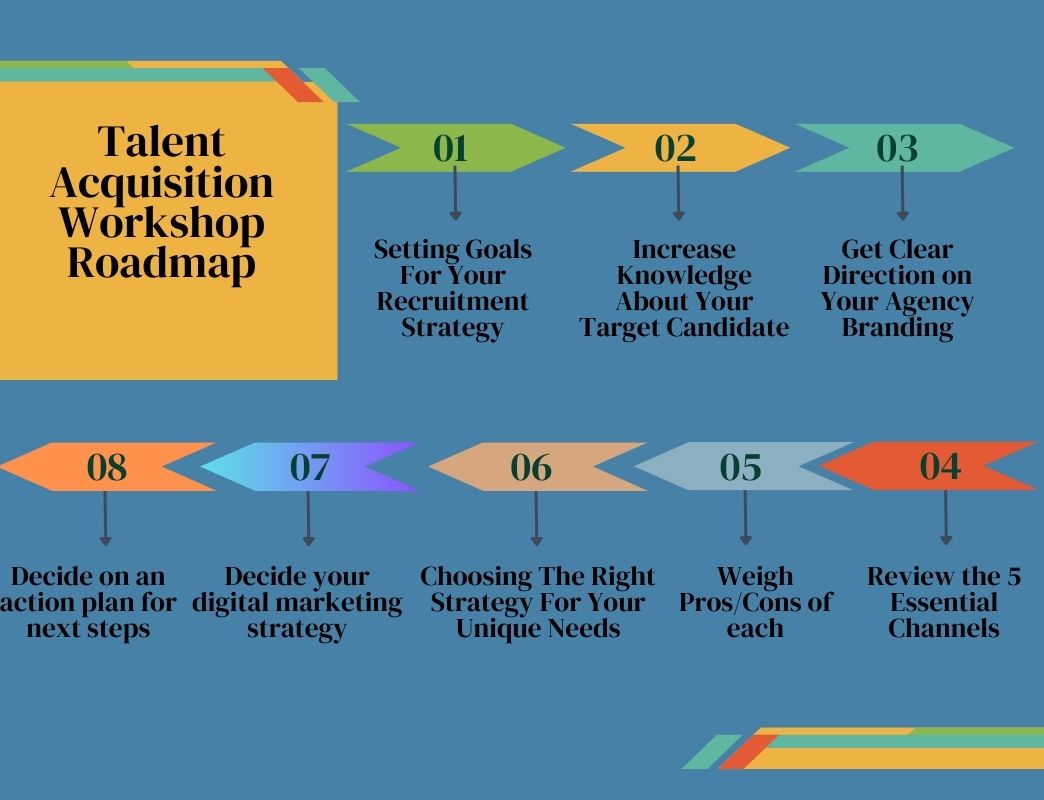Day 1

Laying the Foundation of Your Recruitment Strategy
Before you choose specific digital marketing tactics to include in your recruitment strategy, you need to lay a solid foundation.
In Day 1, you’ll to set goals for your recruitment strategy, increase your knowledge of your ideal candidate, and get clear on your brand.
- Lesson 1: Set Goals for Recruitment Strategy – In Lesson 1, you’ll learn how to set overall goals for your recruitment strategy, improving your ability to execute, track success, and get results.
- Lesson 2: Listen to Your Applicants – In Lesson 2, workshop attendees will learn how to develop an ideal candidate profile (ICP) that will inform their recruiting strategy, increase its effectiveness, and motivate their candidates to act.
- Lesson 3: Get Clear on Your Brand – In Lesson 3, you’ll learn how to clarify your agency brand and what it stands for, so that their recruitment strategy, and the tactics you choose, are powerful and relevant to the brand.
Day 1

Recruitment Channel 1: SEO
Now that we’ve laid the foundation for your recruitment strategy, it’s time to explore the 5 key digital marketing channels for best results. The first channel to explore is SEO.
In Module 2, we’ll look at SEO as a recruitment marketing channel in its own right, focusing on tactics that will have the most impact on your recruitment.
- Lesson 1: What is SEO and How Is It Used to Recruit? – In Lesson 1, we’ll explore what’s involved in SEO as a recruitment marketing channel so public safety recruiters can benchmark their current capabilities.
- Lesson 2: The Pros and Cons of SEO For Recruitment – In Lesson 2, we’ll discuss the pros and cons of SEO for your agency, helping you determine its place in your recruitment strategy.
- Lesson 3: The Keys to An Effective SEO Strategy – In Lesson 3, we’ll show you how you can assess your ability to execute SEO tactics and identify any additional resources you need for success.
Day 2

Recruitment Channel 2: Content Marketing
Most recruiters find that they can better connect with their prospects and boost applicant submissions by incorporating content marketing into their overall recruitment strategy.
In Module 3, we’ll teach you the fundamentals of content marketing, so you can determine which tactics you might want to include in you recruitment plan.
- Lesson 1: What is Content Marketing? – In Lesson 1, you’ll learn the fundamentals of content marketing, so you can assess your current capabilities.
- Lesson 2: The Pros and Cons of Content Marketing – In Lesson 2, we’ll examine the pros and cons of content marketing for your agency, so you can determine its place in your marketing strategy.
- Lesson 3: The Keys to an Effective Content Marketing Strategy – In Lesson 3, workshop attendees will evaluate their ability to execute content marketing tactics and identify any additional resources they need for success.
Day 2

Recruitment Channel 3: Social Media
Social media marketing uses platforms such as Facebook, Instagram, and Twitter to market products/services, increase brand awareness, engage with current customers, and attract new ones.
In Module 4, we’ll investigate social media marketing as a recruitment channel so you can assess whether or not you should include it in your recruitment strategy.
- Lesson 1: What is Social Media Marketing?– In Lesson 1, we’ll describe what’s involved in social media marketing as a recruitment channel, so you workshop attendees can assess their current capabilities.
- Lesson 2: The Pros and Cons of Social Media Marketing – In Lesson 2, we’ll throw light on the pros and cons of social media marketing for recruitment purposes, so you can determine if it has a place in your recruitment strategy.
- Lesson 3: The Keys to an Effective Social Media Marketing Strategy – In Lesson 3, attendees will rate their ability to execute social media marketing tactics and identify additional resources they need for success.
Day 2

Recruitment Channel 4: Email Marketing
A recruiting channel powerhouse if done right, email marketing is closely tied into other channels we’ve explored so far, particularly content marketing.
In Module 5, we’ll examine what’s involved in email marketing, so your attendees can select campaign types and features that would make sense for their ideal prospects.
- Lesson 1: What is Email Marketing? – In Lesson 1, we’ll look at what’s involved in email marketing as a recruitment channel, so attendees can assess their current capabilities.
- Lesson 2: The Pros and Cons of Email Marketing – In Lesson 2, we’ll point out the pros and cons of email marketing for your agency, so you can determine its place in your recruitment strategy.
- Lesson 3: The Keys to an Effective Email Marketing Strategy – In Lesson 3, workshop attendees will consider their ability to execute email marketing tactics and identify the additional resources they need for success.
Day 3

Leveraging Artificial Intelligence
Welcome to Day 3 of the Learn, Connect, and Hire Workshop for Public Safety Agencies. In today’s session, we will explore the benefits of leveraging artificial intelligence (AI) in your recruitment efforts. AI can significantly enhance your ability to recruit faster, more efficiently, and with greater accuracy. By utilizing AI tools and techniques, you can streamline your recruitment process, identify top candidates, and optimize your resources. Let’s dive into the curriculum for today:
Lesson 1: Understanding AI in Recruitment
- Overview of AI: Provide a brief introduction to artificial intelligence and its applications in the recruitment industry.
- AI in Recruitment: Explore how AI technologies, such as machine learning, natural language processing, and predictive analytics, can revolutionize the recruitment process.
- Benefits of AI in Recruitment: Discuss the advantages of using AI, including time and cost savings, improved candidate matching, enhanced decision-making, and reduced bias.
Lesson 2: Implementing AI-Powered Applicant Tracking Systems (ATS)
- Introduction to AI-Powered ATS: Explain the concept of an applicant tracking system enhanced with AI capabilities and how it can optimize your recruitment workflow.
- Key Features and Functions: Explore the various AI-powered features of ATS, such as resume parsing, automated screening, candidate ranking, and intelligent search.
- Selecting an AI-Powered ATS: Provide guidance on evaluating and selecting the right ATS for your agency, considering factors such as scalability, integration capabilities, user-friendliness, and data security
Day 3

Conversational Marketing
Conversational marketing uses tools like SMS, chatbots, and instant messaging to engage applicants, educate prospective candidates, and market your agency’s job opening.
In Module 6, we’ll discuss conversational marketing as a recruitment channel, so attendees can assess whether or not they should include it in their recruitment strategy.
- Lesson 1: What is Conversational Marketing? – In Lesson 1, we’ll describe what’s involved in conversational marketing as a recruitment channel, so attendees can assess whether or not they should include it in their recruiting strategy.
- Lesson 2: The Pros and Cons of Conversational Marketing – In Lesson 2,we’ll weigh the pros and cons of conversational marketing, so attendees can determine if it has a place in their recruitment strategy.
- Lesson 3: The Keys to an Effective Conversational Marketing Strategy – In Lesson 3, attendees will gauge their ability to execute conversational marketing tactics and identify additional resources they need for success.
Day 3

Employer Branding and Candidate Experience
Welcome to Day 4 of the Learn, Connect, and Hire Workshop for Public Safety Agencies. Today, we will focus on the crucial aspects of employer branding and candidate experience. Creating a strong employer brand and delivering a positive candidate experience are essential for attracting and retaining top talent. Let’s explore the curriculum for today:
Lesson 1: Building Your Employer Brand
- Understanding Employer Branding: Explain the concept of employer branding and its significance in attracting high-quality candidates.
- Defining Your Agency’s Value Proposition: Guide participants in identifying and articulating their agency’s unique selling points and employer value proposition.
- Employer Brand Communication: Discuss effective strategies for communicating the agency’s brand to potential candidates through various channels, including social media, career websites, and employee testimonials.
Lesson 2: Crafting a Positive Candidate Experience
- The Importance of Candidate Experience: Highlight the impact of candidate experience on attracting and retaining top talent.
- Candidate Journey Mapping: Teach participants how to map out the candidate journey, from the initial interaction to the final hiring decision, identifying touchpoints and opportunities for improvement.
- Enhancing Communication and Engagement: Provide best practices for maintaining regular and transparent communication with candidates, offering timely feedback, and personalizing the recruitment process.
Wrapping Up

Create Your Digital Marketing Strategy
Now is the time to bring all your recruitment channels and tactics to together!
In Module 7, we’ll have attendees choose the channels and tactics to include in their own, personalized marketing strategy that they can start implementing right away.



